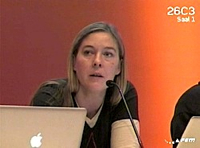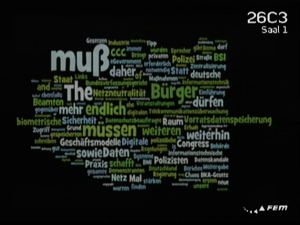The CCCs retrospect for 2009
The first talk in the big hall on day three of 26c3 was the CCC’s retrospect of the year 2009. Due to my slow coffeemaker and hungry kids I missed the months of January and February (please add), and start recounting in March:

New CCC members
Erfa groups (local groups) were started, in Aachen and Mannheim. The map shows regional concentration of CCC hackers plus the number of new members per year. Starting 1997 approx. 100 new members joined “the club” each year.
Next an unpleasant experience of a CCC member was told who had his house searched and all tech equipment confiscated. Law enforcement had believed that who owns a domain (of a bit torrent site in this case) also has the respective hardware at home. It proved that all concerned law enforcers had no idea of what was going on and used their ignorance to keep all things taken in the raid until this December. Only through legal protection covered by the CCC it was given back in the end. Unfortunately German law doesn’t provide for relevant recompensation in such cases while in contrast it is quite easy to get a judge to sign a search warrant.

Constanze Kurz
fundamental right to digital privacy. The vast majority of cases are based on issues of copyright and drugs. Frank Rieger added that we urgently need to push for regulations for the handling of confiscated computers and technical devices. For the time being it’s difficult to even understand where they are and what is done to them and by whom.
In April some 400 people joined a demonstration against censorship. SIGINT, the CCC conference that focuses on politics and society more than the congress in December, took place in Cologne for the first time. The conference was generally perceived as a successful event included a workshop that was especially worth mentioning. Members of different political parties in Germany explained their views: to make a difference it’s not enough to get through with the point that something is factually wrong. It needs to be perceived as wrong by the public to make politicians move. The next SIGINT will again discuss politics in May in Cologne.

Frank Rieger
The CCC clearly is becoming of interest more when the press is seeking information of quotes: there were 1504 inquiries by the media, more than ever before. Germany’s social democrat party apparently has a rather peculiar understanding of confidential talks: during last year’s voting campaign not a lot of support was gathered by the party when it announced its stance pro internet censorship. As a result the CCC was invited to a meeting to discuss both this issue as well as online campaigning. Even though the party had originally asked to keep quiet about the meeting a press release was issued right after. Martin Dörmann, new speaker for new media issues of the SPD group in federal parliament since the former speaker was forced to resign after shady accusations that he possessed child pornography, was quoted. He said in the meeting: “Nobody is planning to erect a censorship infrastructure!”. Apparently without realising the strong resemblance to a historical quote by Walter Ulbricht less than two months before the Berlin wall was built: “Nobody has the intention to erect a wall”.
In June the CCC submitted its statement (pdf, German) on data retention to the constitutional court.
Also in June the local CCC in Mannheim set up a wireless connection that covered 50 km: another reason to point out the extraordinarily creative activities of the local groups. The concept of “geekends” was revived: one ERFA group invites another for a weekend, travel cost covered by the CCC.
 In July the CCC apparently pleased itself enormously by discussing a new set of formal club rules which resulted in some members wondering whether it was a good decision to become a formal German Verein rather than a terrorist organisation, the other option. They then rewarded themselves with a new website that is a great step forward to user friendly content management which was implemented later. It does include WYSIWYG (contrary to this blog’s software, if I might add that). A wordle done using CCC website content showed that there is potential for improving language.
In July the CCC apparently pleased itself enormously by discussing a new set of formal club rules which resulted in some members wondering whether it was a good decision to become a formal German Verein rather than a terrorist organisation, the other option. They then rewarded themselves with a new website that is a great step forward to user friendly content management which was implemented later. It does include WYSIWYG (contrary to this blog’s software, if I might add that). A wordle done using CCC website content showed that there is potential for improving language.
In August the hacker summer camp Hackers at Random (HAR) saw great parties and light installations by the CCC in the Netherlands. In September, due to the elections coming up, a panel discussion had the minister of justice, Brigitte Zypries, discussing technical details she’d better not discuss in public. A source of joy for many hackers present.

Martin Haase
The CCC won a legal battle against the company producing the optical scan voting system meant to be used in Hamburg. The company hat attempted to stop the CCC from publicly claiming to have found technical flaws of the system. The decision by a court in Hamm favored the CCCs point of view in almost all points.

Andy Müller-Maguhn
offline after having been informed of security problems in December. The constitutional court’s hearing on data retention received wide public attention and especially so the CCC’s statement. The event was transmitted to the public by using Twitter. This is not tolerated by the court but in this case so far no legal action was taken. The decision on data retention is expected for spring of 2010.
By Anne Roth, guest-blogging for the CCC